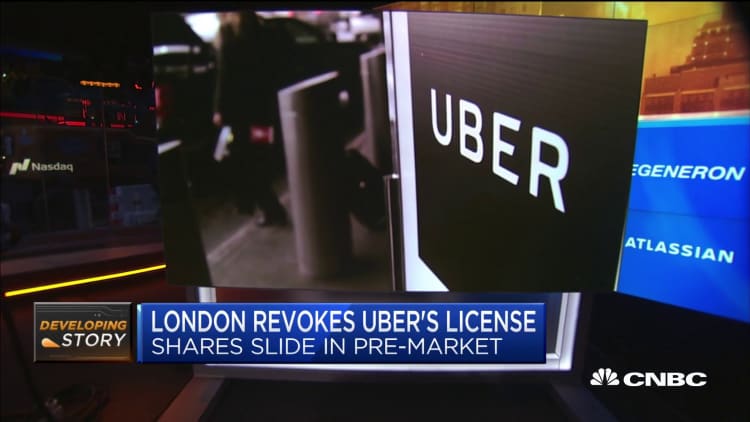Uber is taking its fight against a U.K. ruling that its drivers should be classified as workers to the country's highest court.
The ride-sharing giant will kick off a last-ditch attempt to appeal the landmark employment rights case in a two-day hearing at the Supreme Court on Tuesday.
The legal battle began back in 2016 when an employment tribunal ruled in favor of a group of Uber drivers led by Yaseen Aslam and James Farrar. The claimants want drivers to be treated as workers entitled to employment protections such as a minimum wage and holiday pay.
Each of the country's lower courts — most recently the U.K.'s Court of Appeal — have sided with the drivers in the case.
Another loss for Uber would threaten to jeopardize the company's business model. Uber maintains that its drivers should be treated as self-employed — similar to how many private hire drivers are classified — rather than employees.
"The vast majority of drivers want to work independently, and over a number of years we've made significant changes to our app to offer more benefits with total flexibility," said Jamie Heywood, Uber's regional general manager for Northern and Eastern Europe.
"Drivers can determine if, when and where they drive, but can also access free AXA insurance to cover sickness or injury, as well as maternity and paternity payments."
Lead claimant Aslam, who is also president of the App Drivers & Couriers Union (ADCU), said a loss would result in the trade union's regulator revoking the ADCU's listing, since a union is required by law to be made up "wholly or mainly of workers."
"This is our final showdown with Uber but the stakes could not be higher for everyone," said Aslam. "If Uber wins, there will be an unseemly rush by greedy employers to collapse employment as we know it and Uber-ize the entire economy."
"Uber drivers and other gig economy workers would be robbed of the right to unionize."
Gig economy
The case could have significant ramifications for the gig economy if Uber loses. The gig economy model encourages flexible work arrangements but has been criticized for putting workers in precarious employment situations, especially during the coronavirus pandemic. Other companies in the space include Deliveroo and Airbnb.
Farrar and Aslam are being represented by solicitors Paul Jennings and Rachel Mathieson of London-based law firm Bates Wells.

"This landmark case will have enormous implications for how well, or badly, workers in the fastest growing sector of the economy are treated," said Mathieson, an associate of Bates Wells' employment team.
"At a time when we face economic uncertainty, it is more important than ever that workers receive the basic protections that the law provides for. Uber drivers deserve the minimum wage that their relationship with Uber entitles them to."
Uber has a total of 60,000 drivers in the U.K. Last year, the number of gig workers in the country stood at 4.7 million.
Uber's U.K. legal battle adds to domestic and international pressures facing the firm. It was again banned from operating in London last year — though Uber can continue operating while it appeals the decision.
Meanwhile, California introduced a law known as AB5 this year, which classifies Uber and Lyft drivers as workers. Uber, Lyft and other gig companies have opposed the law, however city officials are seeking an injunction to force them to comply.
In a sign of the times, the Supreme Court hearing on Tuesday and Wednesday is being held in an online format due to the coronavirus pandemic. The court is not expected to reach a decision for some months.


